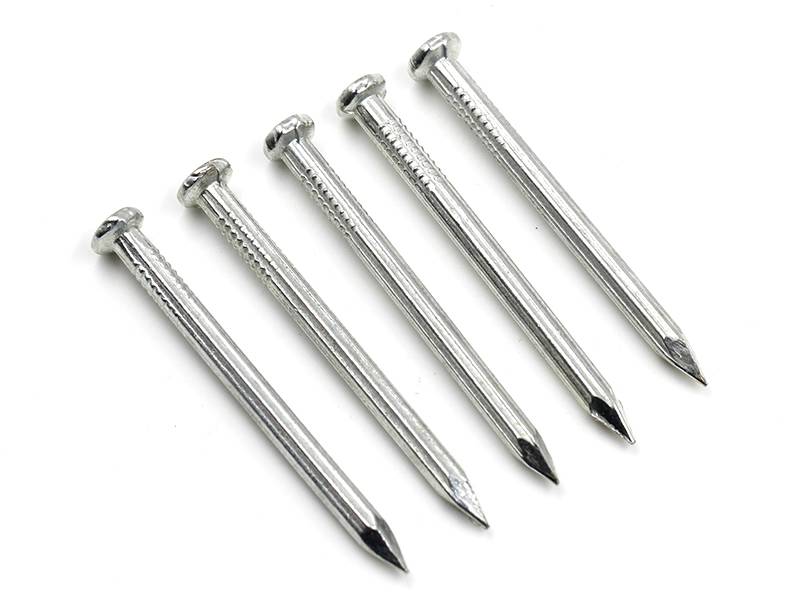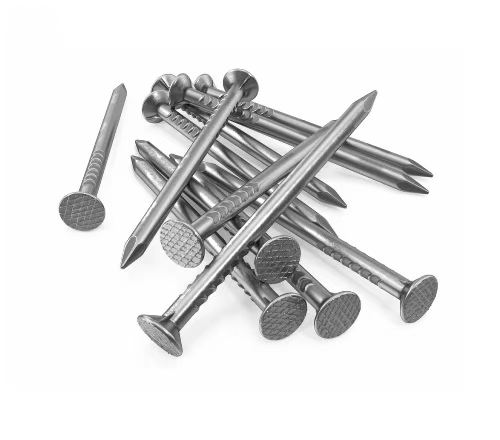When it comes to construction and fastening solutions, choosing the right type of nail can make or break your project. Two popular options—concrete nails and steel nails—often come up in discussions among builders, DIY enthusiasts, and engineers. While both serve the purpose of securing materials, their differences in design, application, and durability can significantly impact performance. In this guide, we’ll break down the key differences between concrete nails and steel nails, helping you decide which is best for your needs.
What Are Concrete Nails?
Concrete nails are specialized fasteners designed for tough, dense surfaces like concrete, masonry, or brick. Typically made from hardened steel or alloy materials, these nails undergo specific heat treatments to enhance their strength and durability. Their unique construction allows them to penetrate hard surfaces without bending or breaking.

Features of Concrete Nails
- Material: Hardened steel or carbide-enhanced alloys.
- Design: Thicker shanks, often with fluted or ribbed surfaces for better grip.
- Surface Treatment: Options like galvanization or nitride coating to resist corrosion.
- Applications: Ideal for attaching wood, metal, or fixtures to concrete or masonry.
Concrete nails are a go-to choice for heavy-duty projects where stability and strength are non-negotiable.
What Are Steel Nails?
Steel nails, on the other hand, are more versatile and widely used across various applications. Made from standard or stainless steel, these nails come in different sizes and shapes depending on the task. While not specifically designed for concrete, they excel in softer materials like wood, drywall, or light metal.

Features of Steel Nails
- Material: Mild steel, stainless steel, or coated steel.
- Design: Slimmer shanks with pointed tips for easy driving.
- Surface Treatment: Polished, galvanized, or titanium-coated for rust resistance.
- Applications: Best for woodworking, framing, or general construction.
Steel nails are the everyday workhorse of fasteners, offering flexibility for a range of projects.
Key Differences Between Concrete Nails and Steel Nails
To make an informed decision, let’s compare these two nail types across several critical factors.
1. Material Strength and Durability
Concrete nails are engineered for toughness. Their hardened steel composition and heat-treated structure allow them to withstand the force required to penetrate concrete without snapping. Steel nails, while durable in softer materials, lack the same level of hardness and may bend or break if used on masonry surfaces.
2. Application Suitability
Concrete nails shine in masonry and concrete applications, where their robust design ensures a secure hold. Steel nails, however, are better suited for wood or lightweight metal fastening. Using steel nails on concrete could result in poor performance or damage to the nail itself.
3. Ease of Use
Driving concrete nails requires more force—often a hammer or a nail gun—due to the resistance of hard surfaces. Steel nails are easier to drive into softer materials, making them a quicker option for less demanding tasks.
4. Corrosion Resistance
Both nail types can feature corrosion-resistant coatings like galvanization or titanium plating. However, concrete nails often face harsher environments (e.g., damp concrete), so their surface treatments are typically more robust. Steel nails may corrode faster if exposed to moisture without proper coating.
5. Cost Considerations
Concrete nails tend to be more expensive due to their specialized materials and manufacturing processes. Steel nails, being more common and versatile, are generally more affordable, making them a budget-friendly choice for simpler projects.
When to Use Concrete Nails
Concrete nails are your best bet when working with:
- Concrete walls or floors.
- Brick or stone masonry.
- Securing metal brackets or wooden frames to hard surfaces.
For example, if you’re installing a wooden baseboard onto a concrete wall, a concrete nail ensures a firm, lasting hold. Their ability to grip dense materials makes them indispensable for structural stability.
When to Use Steel Nails
Opt for steel nails in scenarios like:
- Wood framing or furniture assembly.
- Attaching drywall to wooden studs.
- Lightweight metal or plastic fastening.
If you’re building a wooden deck or assembling a cabinet, steel nails provide the flexibility and ease you need without overcomplicating the process.
Pros and Cons at a Glance
Concrete Nails
- Pros: Exceptional strength, perfect for masonry, long-lasting in tough conditions.
- Cons: Harder to drive, higher cost, less versatile.
Steel Nails
- Pros: Affordable, easy to use, widely available.
- Cons: Not suitable for concrete, less durable in harsh environments.
Tips for Choosing the Right Nail
- Assess Your Material: Match the nail to the surface—concrete nails for masonry, steel nails for wood or softer materials.
- Consider Load Requirements: For heavy-duty fastening, concrete nails offer superior holding power.
- Check Environmental Factors: If moisture is a concern, opt for nails with corrosion-resistant coatings.
- Budget Wisely: Steel nails save money on simple tasks, while concrete nails are worth the investment for durability.
How Quality Fasteners Enhance Project Success
The performance of nails—whether concrete or steel—depends heavily on their manufacturing quality. Precision in material selection, heat treatment, and surface finishing can extend their lifespan and effectiveness. Poorly made nails may fail under pressure, leading to costly repairs or safety hazards. That’s why partnering with a reliable fastener manufacturer is crucial for consistent results.
Conclusion
Choosing between concrete nails and steel nails boils down to your project’s specific needs. Concrete nails excel in masonry and heavy-duty applications, offering unmatched strength for tough surfaces. Steel nails, meanwhile, provide versatility and affordability for woodworking and lighter tasks. By understanding their differences and aligning them with your goals, you can ensure a successful outcome.
For those seeking high-quality fasteners tailored to their needs, companies like Xiluo Mold stand out. With over 23 years of experience, XILUO specializes in producing precision molds for screws, bolts, and other fasteners, delivering customized solutions that meet global standards. Their commitment to quality and innovation makes them a trusted partner for builders worldwide.




